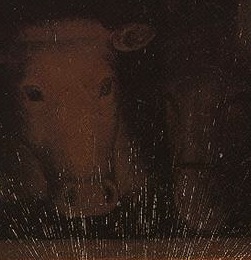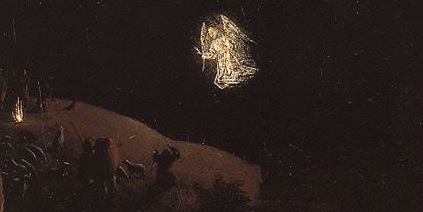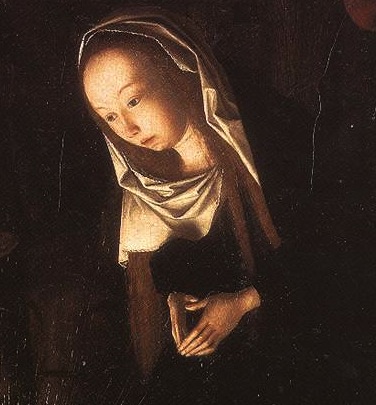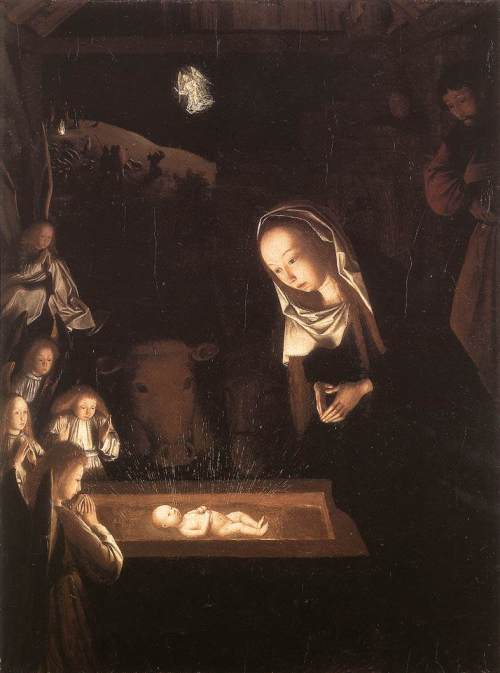I am plunged into deep mire, and there is no standing. Ps 69(68):2
When Christ came into the world, he said, […] a body hast thou prepared for me. Heb 10:5
Caro salutis est cardo. (Salvation hinges on the flesh). Tertulian, De Resurrectione Carnis, VIII
For to what angel did God ever say, “Thou art my Son, today I have begotten thee”? Heb 1:5
The ox knows its owner, and the ass its master’s crib; but Israel does not know, my people does not understand. Is 1:3
The Psalm verse about being plunged into deep mud where there is no standing is usually applied to the Passion, but Charles De Koninck in Ego Sapientia (ch. 20) shows that it can also be applied to the Incarnation. The “deep mud” is the potentiality of matter into which the eternal Son, the pure act of Divinity, is sunk in becoming man. Fashionable theologians throw up their hands in horror at this sort of application. Not only on exegetical grounds, but above all because they are very sensitive to accusation that Christianity despises the body, and material reality. They hastily quote Tertulian’s famous pun, “Caro salutis est cardo.” (Salvation hinges on the flesh). But they seldom quote something else that Tertulian calls the flesh in the very same chapter of De Resurrectione Carnis: “huic substantiae frivolae ac sordidae” (this poor and worthless substance). Tertulian does indeed defend the body against Gnostics and Platonists – the body is neither evil nor pure privation, it is good and created by God – but neither does he have any illusions about its nobility, considered merely according to its nature. Indeed, it is the very lowliness of matter that enables the flesh to be the hinge of salvation.
Material creation, as De Koninck brilliantly shows (ch. 19), has the lowest place in the hierarchy of created things. The purely spiritual creatures, the angels, tower above the material things. A single angel is more perfect than the entire material cosmos. The light of the angelic mind is so brilliant that from the start of their existence the angels know more than all our philosophers and scientists will ever be able to find out. And therefore they have no history. Each angel at the beginning of its existence, with full knowledge, made an irrevocable decision for or against God.
As material creatures we truly compare to pure spirits as mud to stars. We are born in darkness. At first we know nothing, and then slowly, through sensation of of other material things a dim light begins to dawn in our souls. We begin to know the things about us, by reflection we come to know ourselves, and, perhaps, with great difficulty something of our creator. Spread out in matter, we have movement and distention in time. And it is this distention, this weakness, this tenuous instability of our being, that enables us to repent, to change our minds, to have a history. Unlike the angels, man’s fall is not irrevocable; he can return to God. And this is salvation history. God chooses one people out of the nations, he delivers them from slavery, and leads them to the worship of Himself. He pitches His tent among them. Sets up the Ark of His Covenant. Hugh Gilbert likes to point out that the second half of Exodus, which seems so boring, all that incredibly minute, material detail of the Ark of the Covenant, is really the whole point. Matter is what enables fallen man to be lead back to the worship of God.
The true Ark of the Covenant though is Mary in whom God truly dwells. And it is because of her bodily, material nature that Mary is able to be come true Ark, the true Mother of God. “Nigra sum sed formosa: I am black but beautiful.” I am black, I am mud, a lowly being formed from the clay of the earth. But therefore I am able to be the mother of God.
No angel could have been the mother of God. Each angel is one of a kind, a pure form, that so perfectly realizes its own nature that it has no need to be reproduced. The angels are too exalted to have corporeal generation, but they are not exalted enough to have the kind of purely spiritual generation that is the life of the Blessed Trinity. Thus it is the very weakness and imperfection of matter that enable “the Son of God [to] proceed from the very inside of His creation, thus imitating in a very profound manner His generation from the eternal Father.” (Ego Sapientia, ch. 20)
Nigra sum sed formosa: it is precisely the lowliness and imperfection of material existence that allows the baby in Bethlehem to be exalted far above all purely spiritual creatures. “For to what angel did God ever say, ‘Thou art my Son, today I have begotten thee’?” (Heb 1:5)
And it is the inconstancy of material being that allows the birth of God in Bethlehem to bring salvation to the whole human race. “Although he was the Son, he learned obedience through what he suffered.” (Heb 5:8) Through His suffering the Son teaches human nature obedience to God, leading fallen humanity back to God.
There seem to be two main reasons why one might accuse Christianity of despising the body: asceticism, and strict sexual ethics. And yet both of these only make sense because the flesh is the hinge of salvation.
Asceticism is meant to teach our fallen nature obedience. Through fasting, vigils etc. the disorder caused by sin is overcome and man is able to be conformed to the Image of the Son. C.S. Lewis remarks that St Francis’s calling his body “brother ass,” was singularly fitting, the donkey being such a “useful, sturdy, lazy, obstinate, patient, lovable and infuriating beast.” As Robert Louis Stevenson discovered, he who has a donkey needs a goad.
Christian sexual ethics, as Bl. John Paul II has so magnificently shown, flow from a deep insight into the bridal meaning of the body. That which we celebrate on Christmas is God’s marriage with human nature. And it is the body that enables this. (It is really the libertine sexual ethics of late modernity that despise the body; if the body is a meaningless product of chance and necessity, then what does it matter, as Arturo Vasquz would say, which tab goes into which slot?) Coming into the world the Son of David knocks at the door of His beloved and calls out: “Open to me, my sister, my love, my dove, my perfect one; for my head is wet with dew, my locks with the drops of the night.” (Sg 5:2)
That is the gift that we are given at Christmas: the gift of a truly bridal union with God Himself, a union possible only on account of the flesh. And this is the gift that we receive in every Holy Communion. This is why St Bernard of Clairvaux can say:
ipse me osculetur osculo oris sui. […] Merito proinde visiones et somnia non recipio, figuras et aenigmata nolo; ipsas quoque angelicas fastidio species. Quippe et ipsos longe superat Jesus meus specie sua et pulchritudine sua. Non ergo alium sive angelum, sive hominem, sed ipsum peto osculari me osculo oris sui. (In Cantica Canticorum II,2)
In his own person “let him kiss me with the kiss of his mouth” […] With good reason then I avoid trucking with visions and dreams; I want no part with parables and figures of speech; I reject even the very beauty of the angels. For my Jesus utterly surpasses these in his majesty and splendor. Therefore I ask of him what I ask of neither man nor angel: that he kiss me with the kiss of his mouth.





Leave a comment